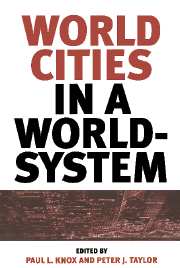Book contents
- Frontmatter
- Contents
- List of contributors
- Preface
- Part 1 Introduction: world city, hypothesis and context
- 1 World cities in a world-system
- 2 Where we stand: a decade of world city research
- 3 World cities and territorial states: the rise and fall of their mutuality
- 4 On concentration and centrality in the global city
- Part 2 Cities in systems
- Part 3 Politics and policy in world cities: theory and practice
- Appendix The world city hypothesis
- Index
3 - World cities and territorial states: the rise and fall of their mutuality
Published online by Cambridge University Press: 07 October 2009
- Frontmatter
- Contents
- List of contributors
- Preface
- Part 1 Introduction: world city, hypothesis and context
- 1 World cities in a world-system
- 2 Where we stand: a decade of world city research
- 3 World cities and territorial states: the rise and fall of their mutuality
- 4 On concentration and centrality in the global city
- Part 2 Cities in systems
- Part 3 Politics and policy in world cities: theory and practice
- Appendix The world city hypothesis
- Index
Summary
The studies that have been stimulated by John Friedmann's world cities hypothesis have been largely contemporary in nature, the chief exception being Anthony King's (1990) work on London as an imperial city. This general concern for the present is no accident and represents the derivation of the original study from Friedmann's initiative in linking urban hierarchies to the ‘new international division of labour’ (Fröbel et al. 1980). Studies of the latter argued that the world economy was entering a new era with the relocation of industrial production to the Third World, with world cities acting as the basing points of capital in this new globalized organization of production. However, the basic assumption of a social discontinuity between the present and what has gone before is in contradiction with the overall framework that world-systems analysis is sometimes thought to provide for world city studies. For this theoretical schema the emphasis is on a basic structural continuity in a single capitalist world-economy that can be traced back to around 1500 (Wallerstein 1983). Here I will approach the study of world cities from an explicitly world-systems perspective, which means, minimally, setting contemporary world cities into their longue durée context. If there are any benefits to be gained from this exercise it is likely that they will be two-way: as well as extending concern for world cities beyond their contemporary existence we will be focusing on the role of cities in the world-economy, a topic relatively neglected in world-systems analysis (the work of Fernand Braudel (1984) is a major exception).
- Type
- Chapter
- Information
- World Cities in a World-System , pp. 48 - 62Publisher: Cambridge University PressPrint publication year: 1995
- 48
- Cited by



